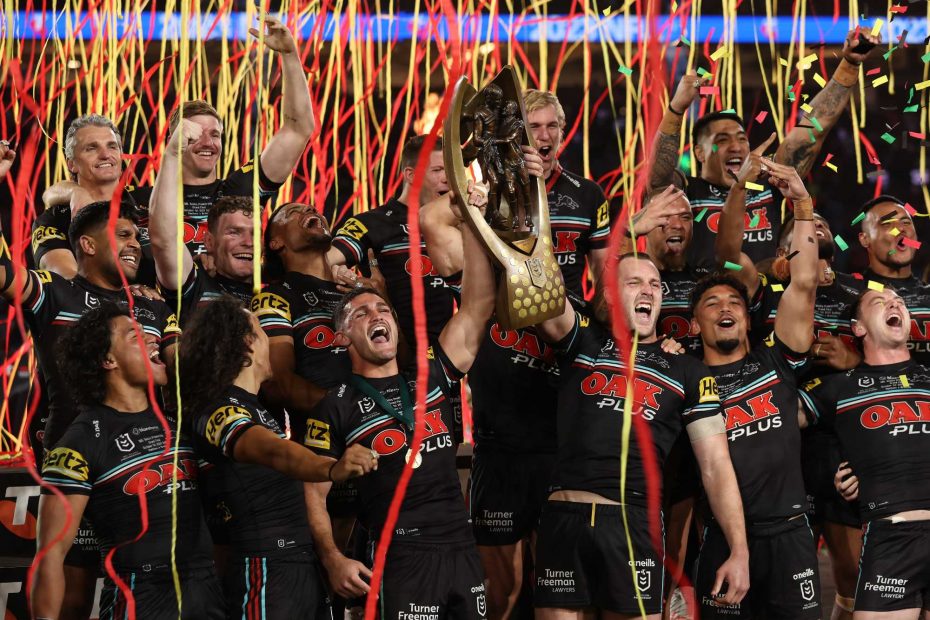The paradox of parity is that even though we’re told we should want a wide open competition, the NRL seems to be more interesting when there’s a top dog to knock off.
Or top cats as is the current case with the Panthers the undisputed kings of the rugby league jungle.
Fans want parity in the competition and some hope that their team is a chance to win the premiership but the reality is that no matter how strictly the salary cap is enforced, there will never be a level playing field.
The vast difference in professionalism and expertise off the field in the front offices and coaches’ boxes means some clubs will buck the cyclical trends of professional sport in a good way while others will be mired in mediocrity.
Penrith are red-hot favourites to become the first team to win four titles on the trot since the end of St George’s mighty “never before, never again” era of 11 straight premierships ended in 1966.
After seven rounds, their odds with the bookmakers have shortened to $3.25 with supposed contenders South Sydney, Parramatta and Newcastle falling by the wayside and now rated 50-1 shots at best.
North Queensland are clinging on at $19 with the Warriors ($17), Sea Eagles and Sharks ($15), Roosters ($10), Storm ($6.50) and Broncos ($4) rated a realistic chance of ending the Cat Empire in Sydney’s golden west.
Penrith, Melbourne and the Roosters are the only clubs who have lifted the NRL trophy in the past seven seasons and if you stretch that timeframe back to 2012, the only other clubs who have won the premiership are South Sydney, North Queensland and Cronulla.
Not since the Broncos of the 1990s has a team been as dominant as this current Panthers line-up under Ivan Cleary.
(Photo by Matt King/Getty Images)
Wayne Bennett’s side collected five titles in an eight-year stretch, one carrying the Super League split competition asterisk, with a star-studded roster filled with all-time greats like Allan Langer, Glenn Lazarus, Steve Renouf, Wendell Sailor and Gorden Tallis.
Parramatta and Canterbury each had their golden era in the 1980s, delivering a rivalry while they dominated.
When a club manages sustained success, they quickly go from being a feelgood story to the villains.
The Raiders of the early 1990s and the Storm and Roosters in recent times are other examples of teams that were lauded for their skill and brilliance but quickly became public enemy No.1 with opposition fans as they continued to rack up the wins.
Penrith are now in that category. Every team lifts when they see them on the schedule but Cleary’s cohort remains the competition benchmark.
On the back of Jarome Luai’s antics, which is either a sign of arrogance or confidence depending on your viewpoint, rival fans now have the Panthers high on their list of teams they love to beat, which was never previously the case.
And even though the Panthers have won the past three premierships, a conversion attempt here or a missed tackle there and they could be in a similar situation to Ricky Stuart’s Roosters of the early 2000s and Bob Fulton’s Manly side in the mid 90s who made three straight Grand Finals but came away with just one trophy.
As great as the Panthers have been, it is not a fait accompli that they will win again in 2024, far from it – Brisbane have the firepower, Melbourne have the all-round grit, the Roosters could be contenders if they get their act together while the Warriors, Sharks and Sea Eagles have “on their day” capability of knocking over any opponent in the playoffs.
The flip side to dynasty eras is the unusual seven-year stretch at the turn of the century when for the first time, seven clubs became premiers in consecutive seasons.
It became part of the NRL’s advertising campaigns that any team could be the last one standing as head office trumpeted the open nature of the competition.
Sadly for the spin doctors, this was an anomaly, not the norm.
With the introduction of the Dolphins last year and as many as three new expansion teams being brought into the NRL by the end of the decade, it is going to be harder for teams at the bottom of the ladder to recruit marquee stars from the top clubs.
The Dolphins initially struggled to land a big name in free agency but once they showed they were not going to be easybeats, they quickly snared the signatures of Herbie Farnworth and Tom Flegler for this season.
Penrith, Brisbane and Melbourne have the nucleus of their elite players signed long term and apart from the odd unexpected departure like James Fisher-Harris last week announcing his return to New Zealand due to family reasons, the lower-ranked clubs are going to have to play the long game to become title contenders.
Wests Tigers are finally tapping into their huge junior nursery under Benji Marshall rather than looking for the quick fix which has had them in a constant boom (if you count ninth place as a high watermark) then bust cycle for the past 12 years of missing the finals.
Canterbury have taken the chequebook route in recent seasons and despite a few encouraging performances lately, the spending spree has done little to bring the glory days back to Belmore.
The Dogs have not finished in the top six on the ladder since 2015 while for the Dragons (2011), Tigers (2011) and Titans (2010), it has been even longer.
Parity is and should always be the goal for the NRL but in reality it is rarely the case and fans love to see a tall-poppy team like the current Penrith champions finally get knocked off.
